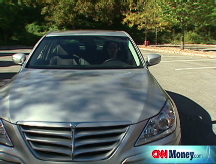Expect more hard-times car incentives
Industry experts expect other automakers to copy 'Hyundai Assurance' car give-back program.
NEW YORK (CNNMoney.com) -- Hyundai created something truly novel with the "Hyundai Assurance" sales incentive it announced at the beginning of 2009: An auto sales incentive that seems to actually be working.
Last month, just after the Assurance program was announced, Hyundai had the largest sales increase of any automaker, and it was one of only three with any increase at all. While sales plummeted 37% industry-wide, Hyundai's were up by more than 14% compared to January of last year.
So expect other automakers to jump in with similar promotions, experts say. And Hyundai is already working on new ways to spin its own idea.
The deal is this: If you buy a Hyundai and then lose your job within a year, Hyundai will take back the car and absorb any loss in the car's value up to $7,500.
Beginning this week, Hyundai also offers to absorb up to the three months of payments for you, in the event that you lose your income, while you keep the car.
If you haven't got a new job by then, you can give the car back, without making any more payments.
Because the loan is paid off, a Hyundai owner's credit rating won't be damaged by taking advantage of the offer.
"It addresses the very thing that's likely keeping consumers away from making a big purchase," said Anthony Pratt, an auto industry analyst with Price Waterhouse Coopers.
With the economy weak and lay-offs on the rise, many car buyers are waiting till things get better before they buy. Taking away some of that fear makes it easier for shoppers to move, said Pratt.
"Clearly the marketing guys at Hyundai are pretty sharp," said Jeff Bartlett, an auto writer with Consumer Reports magazine. "They're playing to their strengths and to consumer concerns."
Hyundai is already seen as a value-focused brand, he said. Consumers already look to them as a financially conservative choice.
Although Hyundai's marketing gamble seems to be paying off, some in the industry caution that other factors could be at work here.
"You can't just peg it to the program, but it certainly has had an impact," said Jeff Schuster, executive director of forecasting for J.D. Power and Associates.
"We had the foresight to have a terrible January last year," joked David Zuchowski, vice president for sales at Hyundai Motor America. Besides having abysmal sales in January, 2008, another factor helping Hyundai was the fact that the Korean automaker's Genesis full-size sedan took the Car of the Year Award at the Detroit Auto Show that month. That brought more positive attention to the brand.
Jack DaPalo, General Manager of a Hyundai dealership in Long Island City, NY, said the Assurance program, along with the Genesis, has been bringing customers into his showroom. "I'm starting to see more and more people coming in saying 'Tell me a little more about the Assurance Program," he said.
When February sales are tallied, Schuster predicted, the benefits of Hyundai's program will likely become more clear. Other automakers can be expected to copy Hyundai as quickly as they can, he said.
"I think this would be a relatively easy thing to incorporate for other brands," he said.
Businesses outside the auto industry are already running similar programs. Discount airline JetBlue announced a program earlier this month in which the airline agrees to refund the cost of a ticket if the purchaser loses his or her job before the day of the flight.
Hyundai's program is managed by a Walkaway USA, a subsidiary of Dallas-based EFG Companies, which provides finance and insurance products and support services for auto dealers. Walkaway has already been approached by other automakers, said Jeff Beaver, senior vice president for marketing at EFG.
Walkaway has an exclusive agreement with Hyundai, that only covers the specific program Hyundai offers. A few changes to the basic agreement could create an entirely new program that does basically the same thing, while avoiding any conflict with Hyundai, Beaver said.
Several major automakers declined to comment on whether they might follow Hyundai's lead.
Hyundai itself is already looking at ways to expand on the basic premise of the Assurance program, said Zuchowski.
"Negative equity protection, that's something we're looking at," he said. Under that sort of program, a Hyundai buyer would be able to trade in their car for another one at any time and, if the car they're trading in is worth less than the remaining balance on the loan, Hyundai would cover that difference.
Should one of the major Detroit automakers be forced into Chapter 11 bankruptcy, another possible outcome of this economic downturn, perhaps we could see an altogether new kind of assurance program, suggested Pratt of Price Waterhouse Coopers.
This time, the assurance would run the other way. It would be assurance against the automakers' loss of ability to stay in business and provide parts and service, he said.
"The consumers would need some type of insurance to keep those vehicles on their short list of vehicles to buy," he said. ![]()


